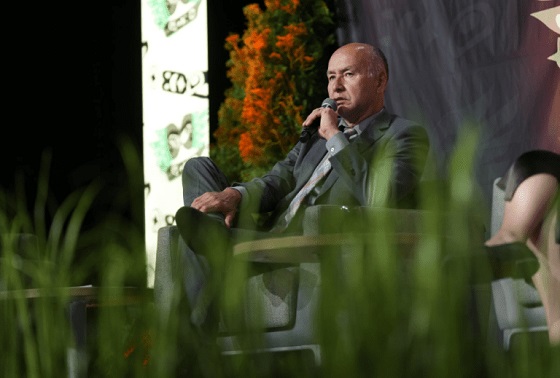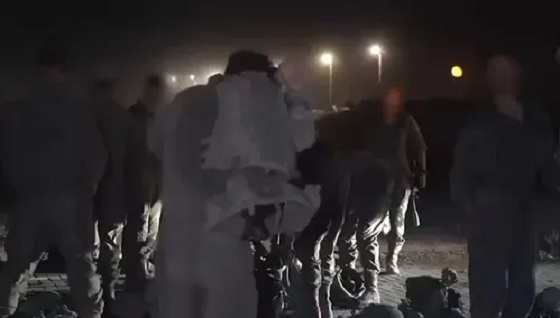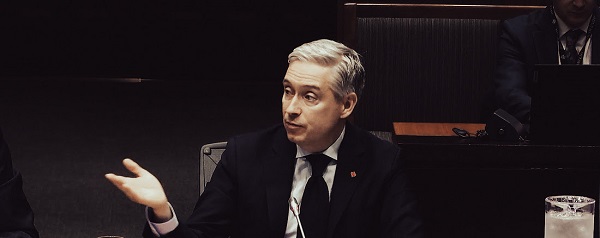Economy
Ottawa’s muddy energy policy leaves more questions than answers

From the Fraser Institute
Based on the recent throne speech (delivered by a King, no less) and subsequent periodic statements from Prime Minister Carney, the new federal government seems stuck in an ambiguous and ill-defined state of energy policy, leaving much open to question.
After meeting with the premiers earlier this month, the prime minister talked about “decarbonized barrels” of oil, which didn’t clarify matters much. We also have a stated goal of making Canada the world’s “leading energy superpower” in both clean and conventional energy. If “conventional energy” includes oil and gas (although we’re not sure), this could represent a reversal of the Trudeau government’s plan to phase-out fossil fuel use in Canada over the next few decades. Of course, if it only refers to hydro and nuclear (also forms of conventional energy) it might not.
According to the throne speech, the Carney government will work “closely with provinces, territories, and Indigenous Peoples to identify and catalyse projects of national significance. Projects that will connect Canada, that will deepen Canada’s ties with the world, and that will create high-paying jobs for generations.” That could mean more oil and gas pipelines, but then again, it might not—it might only refer to power transmission infrastructure for wind and solar power. Again, the government hasn’t been specific.
The throne speech was a bit more specific on the topic of regulatory reform and the federal impact assessment process for energy projects. Per the speech, a new “Major Federal Project Office” will ensure the time needed to approve projects will be reduced from the currently statutory limit of five years to two. Also, the government will strike cooperation agreements with interested provinces and territories within six months to establish a review standard of “one project, one review.” All of this, of course, is to take place while “upholding Canada’s world-leading environmental standards and its constitutional obligations to Indigenous Peoples.” However, what types of projects are likely to be approved is not discussed. Could be oil and gas, could be only wind and solar.
Potentially good stuff, but ill-defined, and without reference to the hard roadblocks the Trudeau government erected over the last decade that might thwart this vision.
For example, in 2019 the Trudeau government enacted Bill C-48 (a.k.a. the “Tanker Ban Bill”), which changed regulations for large oil transports coming and going from ports on British Columbia’s northern coast, effectively banning such shipments and limiting the ability of Canadian firms to export to non-U.S. markets. Scrapping C-48 would remove one obstacle from the government’s agenda.
In 2023, the Trudeau government introduced a cap on Canadian oil and gas-related greenhouse gas emissions, and in 2024, adopted major new regulations for methane emissions in the oil and gas sector, which will almost inevitably raise costs and curtail production. Removing these regulatory burdens from Canada’s energy sector would also help Canada achieve energy superpower status.
Finally, in 2024, the Trudeau government instituted new electricity regulations that will likely drive electricity rates through the roof, while ushering in an age of less-reliable electricity supply: a two-handed slap to Canadian energy consumers. Remember, the throne speech also called for building a more “affordable” Canada—eliminating these onerous regulations would help.
In summation, while the waters remain somewhat muddy, the Carney government appears to have some good ideas for Canadian energy policy. But it must act and enact some hard legislative and regulatory reforms to realize the positive promises of good policy.
Business
The Grocery Greed Myth

Haultain’s Substack is a reader-supported publication.
To receive new posts and support our work, please consider becoming a free or paid subscriber.
Try it out.
The Justin Trudeau and Jagmeet Singh charges of “greedflation” collapses under scrutiny.
“It’s not okay that our biggest grocery stores are making record profits while Canadians are struggling to put food on the table.” —PM Justin Trudeau, September 13, 2023.
A couple of days after the above statement, the then-prime minister and his government continued a campaign to blame rising food prices on grocery retailers.
The line Justin Trudeau delivered in September 2023, triggered a week of political theatre. It also handed his innovation minister, François-Philippe Champagne, a ready-made role: defender of the common shopper against supposed corporate greed. The grocery price problem would be fixed by Thanksgiving that year. That was two years ago. Remember the promise?
But as Ian Madsen of the Frontier Centre for Public Policy has shown, the numbers tell a different story. Canada’s major grocers have not been posting “record profits.” They have been inching forward in a highly competitive, capital-intensive sector. Madsen’s analysis of industry profit margins shows this clearly.
Take Loblaw. Its EBITDA margin (earnings before interest, taxes, depreciation, and amortization) averaged 11.2 per cent over the three years ending 2024. That is up slightly from 10 per cent pre-COVID. Empire grew from 3.9 to 7.6 per cent. Metro went from 7.6 to 9.6. These are steady trends, not windfalls. As Madsen rightly points out, margins like these often reflect consolidation, automation, and long-term investment.
Meanwhile, inflation tells its own story. From March 2020 to March 2024, Canada’s money supply rose by 36 per cent. Consumer prices climbed about 20 per cent in the same window. That disparity suggests grocers helped absorb inflationary pressure rather than drive it. The Justin Trudeau and Jagmeet Singh charges of “greedflation” collapses under scrutiny.
Yet Ottawa pressed ahead with its chosen solution: the Grocery Code of Conduct. It was crafted in the wake of pandemic disruptions and billed as a tool for fairness. In practice, it is a voluntary framework with no enforcement and no teeth. The dispute resolution process will not function until 2026. Key terms remain undefined. Suppliers are told they can expect “reasonable substantiation” for sudden changes in demand. They are not told what that means. But food inflation remains.
This ambiguity helps no one. Large suppliers will continue to settle matters privately. Small ones, facing the threat of lost shelf space, may feel forced to absorb losses quietly. As Madsen observes, the Code is unlikely to change much for those it claims to protect.
What it does serve is a narrative. It lets the government appear responsive while avoiding accountability. It shifts attention away from the structural causes of price increases: central bank expansion, regulatory overload, and federal spending. Instead of owning the crisis, the state points to a scapegoat.
This method is not new. The Trudeau government, of which Carney’s is a continuation, has always shown a tendency to favour symbolism over substance. Its approach to identity politics follows the same pattern. Policies are announced with fanfare, dissent is painted as bigotry, and inconvenient facts are set aside.
The Grocery Code fits this model. It is not a policy grounded in need or economic logic. It is a ritual. It gives the illusion of action. It casts grocers as villains. It gives the impression to the uncaring public that the government is “providing solutions,” and that “it has their backs.” It flatters the state.
Madsen’s work cuts through that illusion. It reminds us that grocery margins are modest, inflation was monetary, and the public is being sold a story.
Canadians deserve better than fables, but they keep voting for the same folks. They don’t think to think that they deserve a government that governs within its limits; a government that accept its role in the crises it helped cause, and restores the conditions for genuine economic freedom. The Grocery Code is not a step in that direction. It was always a distraction, wrapped in a moral pose.
And like most moral poses in Ottawa, it leaves the facts behind.
Haultain’s Substack is a reader-supported publication.
To receive new posts and support our work, please consider becoming a free or paid subscriber.
Try it out.
Business
Carney government plans to muddy the fiscal waters in upcoming budget

From the Fraser Institute
By Jake Fuss and Grady Munro
Rather than directly spend money on critical infrastructure such as roads, bridges, ports or even electricity grids—things that traditionally are considered capital investments—the government plans to spend money on subsidies and tax breaks to corporations (i.e. corporate welfare) under the umbrella of “capital investment”
The Carney government’s long-awaited first budget is almost here—expected Nov. 4—but Canadians may not recognize what they get. Early on, the new government promised a new approach to spending. Thanks to a decade of record-breaking spending under Justin Trudeau, the federal deficit sits at a projected $48.3 billion while total debt has eclipsed $2.1 trillion. But the Carney government’s plan announced this week appears to rely on accounting maneuvers rather than any substantive spending reductions.
According to the latest details released by the government, the Carney government will separate spending into two categories: “operating spending” and “capital investment.” Within this framework, the government plans to balance the “operating budget” within three years.
But of course, if the government eventually balances the operating budget, that doesn’t mean it will stop borrowing money to pay for“capital investment”—a new category of spending the government can define and expand whenever it deems necessary.
Currently, according to the government, capital investment will include any spending or tax expenditures (e.g. tax credits and deductions) that “contribute to capital formation”—the creation of assets (such as machinery or equipment) that improve the ability of workers to produce goods and services.
In other words, rather than directly spend money on critical infrastructure such as roads, bridges, ports or even electricity grids—things that traditionally are considered capital investments—the government plans to spend money on subsidies and tax breaks to corporations (i.e. corporate welfare) under the umbrella of “capital investment,” so long as this spending will somehow “encourage” capital formation. But clearly, corporate welfare doesn’t belong in the same category as the expansion of a critical port, for example, and the government shouldn’t pretend that it does.
Put simply, because the term “capital investment” is so broad and malleable, the government can seemingly use it whenever it wants. For example, to meet NATO’s spending target of 2 per cent of GDP, a key point of contention in Carney’s negotiations with President Trump, the Carney government could (inaccurately) categorize some defence spending as capital spending. And in fact, the Parliamentary Budgetary Officer—Ottawa’s fiscal watchdog—views the Carney government’s definition as “overly expansive” and suggests the inclusion of corporate tax breaks and subsidies will “overstate” the government’s actual contribution to the creation of capital.
This approach by the Carney government will not help Canadians understand the true state of federal finances. While Finance Minister François-Philippe Champagne recently said that the “deficit and the debt will be recorded in the same manner as in previous budgets,” on budget day and beyond the government will undoubtedly focus on the operating budget when communicating to Canadians. So, the government will only tell part of the story.
After years of fiscal mismanagement with large increases in spending and debt under the Trudeau government, Canadians need a government willing to make the tough decisions necessary to get federal finances back in shape. But the Carney government appears poised to shirk accountability and use tricks to cloud the true state of federal finances.
-

 Alberta1 day ago
Alberta1 day agoFact, fiction, and the pipeline that’s paying Canada’s rent
-

 Energy2 days ago
Energy2 days agoIn the halls of Parliament, Ellis Ross may be the most high-profile advocate of Indigenous-led development in Canada.
-

 Energy2 days ago
Energy2 days ago“It is intellectually dishonest not to acknowledge the … erosion of trust among global customers in Canada’s ability to deliver another oil pipeline.”
-

 Aristotle Foundation2 days ago
Aristotle Foundation2 days agoEfforts to halt Harry Potter event expose the absurdity of trans activism
-

 International16 hours ago
International16 hours agoTrump gets an honourable mention: Nobel winner dedicates peace prize to Trump
-

 Bruce Dowbiggin2 days ago
Bruce Dowbiggin2 days agoCanada’s Humility Gene: Connor Skates But Truckers Get Buried
-

 Business8 hours ago
Business8 hours agoCarney government plans to muddy the fiscal waters in upcoming budget
-

 International1 day ago
International1 day agoTrump-brokered Gaza peace agreement enters first phase








